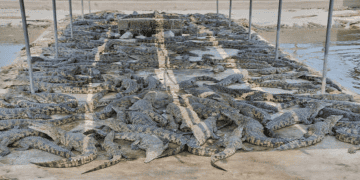The Mekong Delta region, particularly Dong Thap province, is known for its strong potential in crocodile farming. Recent agreements between Vietnam and China have paved the way for expanding Vietnam’s crocodile exports, contributing to the stable and sustainable development of the sector. According to the Ministry of Agriculture and Rural Development (MARD), China is the primary importer of live crocodiles from Vietnam, accounting for over 99% of live crocodile exports and 29% of salted crocodile skins. Vietnam also exports crocodile products to other markets, including Japan, Thailand, Singapore, and several European Union countries.
However, since November 2019, China has suspended imports of live crocodiles from Vietnam, creating challenges for farms in southern regions, where over 114,000 live crocodiles are awaiting export. The recently signed protocols are expected to resume these exports and support future growth for the industry. In Dong Thap province alone, there are 36 crocodile farms with a combined population of approximately 190,000 crocodiles. Among them, My Hiep Enterprise in Cao Lanh district has over 177,000 crocodiles primarily for export, while smaller farms focus on raising young crocodiles for larger operations.
Despite the renewed export potential, the crocodile industry in Vietnam still faces significant challenges. A major issue is the decline in crocodile skin prices, impacting profitability for many exporters. To ensure sustainable development, farms must adhere to the newly established export protocols, meet disease control requirements, and uphold environmental standards.
MARD has emphasized the need for local authorities and businesses to fully understand and implement the export regulations. It has urged localities to develop responsible farming plans that align with both Vietnamese and international standards, while preventing disease outbreaks and protecting the environment. To support industry growth, MARD has introduced several initiatives, such as establishing data management systems for product traceability and disease monitoring. Businesses are encouraged to invest in infrastructure upgrades to meet export standards, focusing on hygiene, disease control, and environmental compliance.
Pham Thien Nghia, Chairman of the Dong Thap People’s Committee, has requested MARD’s support in disease testing and building a traceability system to ensure the quality and reputation of Vietnamese crocodile products. Looking ahead, MARD plans to continue raising awareness and providing guidance to businesses regarding the new protocols. The ministry will also maintain close collaboration with Chinese authorities to ensure a smooth and compliant export process.
Your go-to source for supply chain logistics news updates: The Supply Chain Report. Enhance your international trade knowledge at ADAMftd.com.
#AgricultureNews #ExportUpdate #VietnamCrocodileIndustry #SustainableFarming #TradeOpportunities















